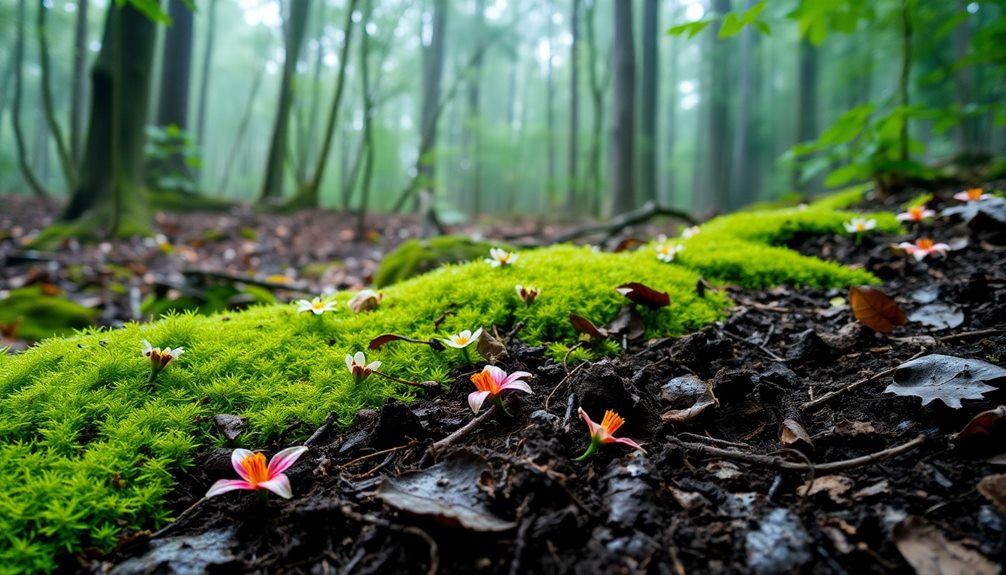When you take in the smell of earth, you're greeted by a wonderful mix of fresh rain and rich, damp soil. Think about the scent of grass after a summer rain, with hints of moss and even salty beach air. This amazing aroma comes from plant oils, soil bacteria, and decaying leaves, all working together. It can evoke happy memories of playing outside or exploring nature. Each whiff tells a unique story of the environment around you, connecting you to the beauty of the earth. If you're curious about how these scents shape our experiences, there's so much more to discover!
Key Takeaways
- Earth emits an invigorating scent after rain, known as petrichor, due to oils from plants and soil bacteria mixing with rainwater.
- The smell features earthy tones from damp soil, complemented by hints of grass, moss, and decaying leaves.
- Geosmin, a compound released by soil bacteria, significantly contributes to the distinctive earthy aroma.
- Different environments, like forests and beaches, offer unique scents that reflect their natural surroundings.
- The scent of wet earth often evokes nostalgia and symbolizes growth and new beginnings in various cultures.
Introduction
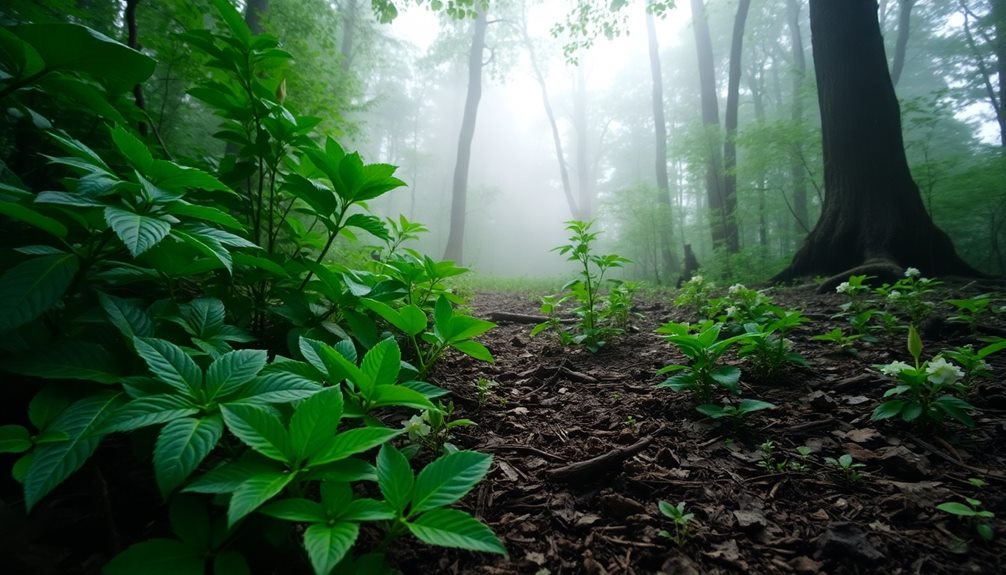
When you step outside after a rainstorm, you might catch a whiff of something earthy and fresh. This unique scent, often called "petrichor," is one of nature's little gifts. It's a reminder of how the world around you comes alive after a good soak. You might notice how the grass looks greener, the flowers seem brighter, and the air feels crisp and clean.
But have you ever stopped to think about what causes that delightful smell? When rain hits the ground, it releases oils from plants and bacteria in the soil. These elements mix together, creating that unmistakable aroma. It's fascinating to realize that something as simple as rain can create such a complex fragrance.
This smell can evoke memories of playing outside, splashing in puddles, or just enjoying a peaceful moment in your backyard.
Whether you're an outdoor enthusiast or someone who enjoys a cozy day inside, the scent of earth after rain connects us all to nature.
Description of the Smell

Breathe in deeply, and you'll notice that the smell of earth is a rich tapestry of scents, each layer telling a story. Imagine standing in a forest after a gentle rain. You catch a whiff of damp soil, fresh and invigorating, like nature's way of saying, "I'm alive!" This earthy aroma can feel grounding and calming, wrapping you in a warm embrace.
As you explore further, you might detect hints of grass and moss, mingling together to create a lively, green scent. It's like stepping into a hidden garden, where every breath brings you closer to the wonders of nature.
If you've ever walked on a beach after the tide has receded, you may recognize the salty, briny notes that mingle with the earthy scent, reminding you of the ocean's rhythm.
You may also encounter the sweet smell of decaying leaves, a reminder of the life cycle around you. This scent isn't unpleasant; it's nature's way of recycling.
Source and Composition
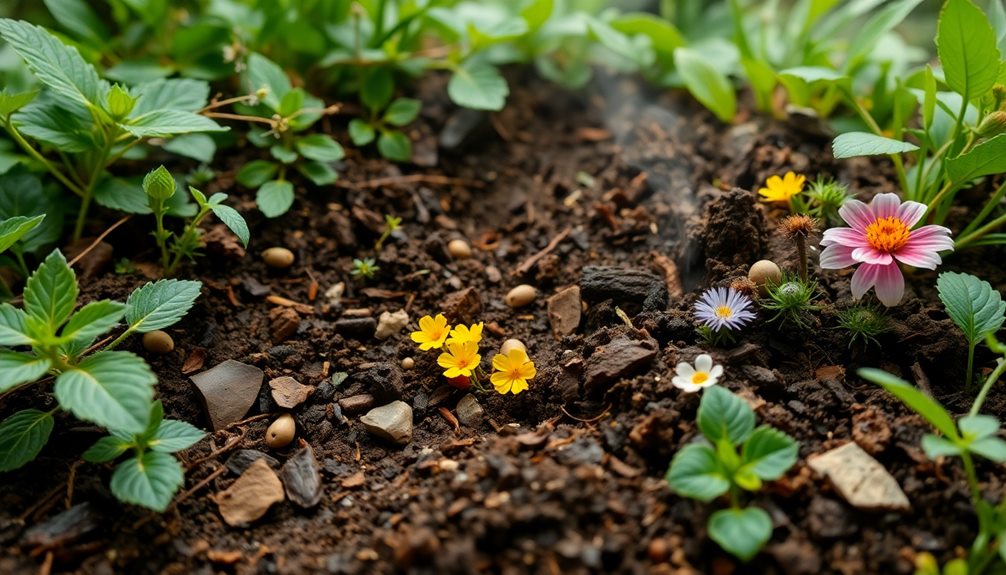
The earth's scent comes from a complex mix of organic compounds, primarily produced by microorganisms and decaying matter. When you step outside after a rain shower, you might notice a fresh smell. That's actually a result of compounds like geosmin, released by soil-dwelling bacteria. These tiny creatures break down organic material, creating a rich environment full of life.
You'll also find that fallen leaves and decomposing plants contribute to this aroma. As they break down, they release various volatile organic compounds. These compounds can evoke feelings of warmth and nostalgia, connecting you to nature in a special way.
Another source of that earthy scent is the fungi in the soil. These organisms play a crucial role in breaking down complex organic matter, which adds to the overall fragrance of the earth.
Even the atmosphere plays a part! When raindrops hit the ground, they release aerosols that carry these smells into the air.
Typical Scenarios or Environments

Stepping into a lush forest after a rainstorm immerses you in a symphony of earthy scents. The air feels fresh and alive, filled with the smell of damp soil and green leaves. You might catch a hint of pine as a gentle breeze brushes past, inviting you to breathe deeply.
Each step you take reveals new aromas, from the sweet scent of wildflowers to the rich, musky fragrance of decaying wood.
Walking along a sandy beach, you'll notice a different perfume. The salty air mingles with the scent of wet sand and seaweed. As waves crash, they release a crisp, clean smell that's invigorating. It makes you feel connected to nature and the vast ocean.
In your backyard, after mowing the lawn, you might smell freshly cut grass. This lively scent is often associated with summer days spent playing outside. It brings back memories of laughter and sunshine.
Each of these environments presents unique smells that reflect their surroundings. Whether in a forest, at the beach, or your own yard, you can appreciate the beauty and variety of earth's fragrances.
Emotional or Cultural Associations
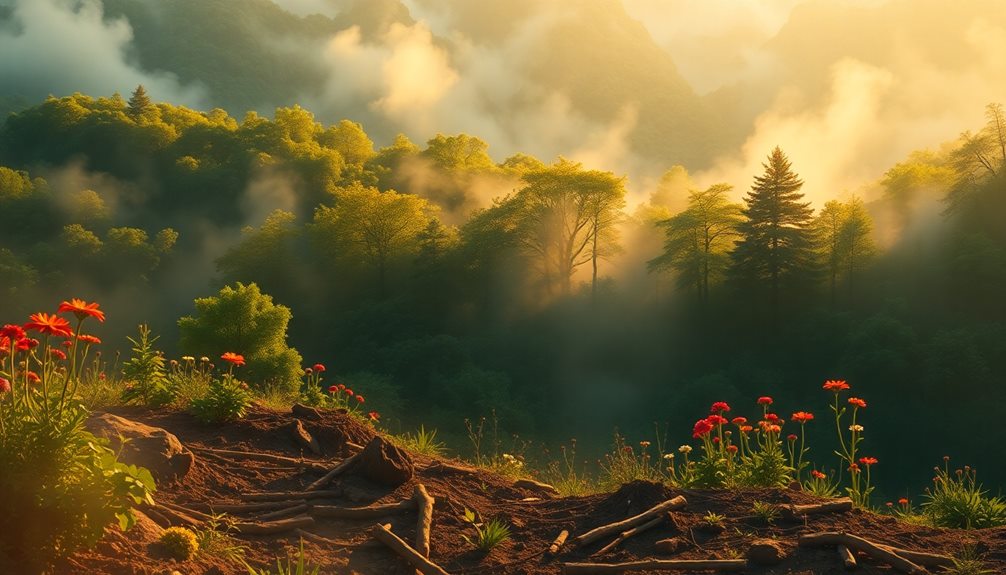
There's something deeply nostalgic about the smell of freshly turned earth, often evoking memories of childhood adventures in the garden or family gatherings around a campfire. When you breathe in that rich, earthy scent, you might remember the joy of digging in the dirt, planting seeds, or the laughter shared while roasting marshmallows. Each whiff can transport you back to those moments, filling your heart with warmth.
Culturally, earth smells connect people to their roots. In many traditions, the earth symbolizes life and growth. It's often seen as a source of nourishment, both physically and spiritually. Think about how many cultures celebrate the harvest, honoring the land that provides.
You might also notice how the scent of rain-soaked earth, or petrichor, brings a sense of peace. It reminds you of fresh starts and new beginnings.
Whether you're out hiking, gardening, or simply enjoying nature, these smells create a bond with the world around you. They remind you of home, family, and the moments that shape who you are.
Health or Safety Considerations
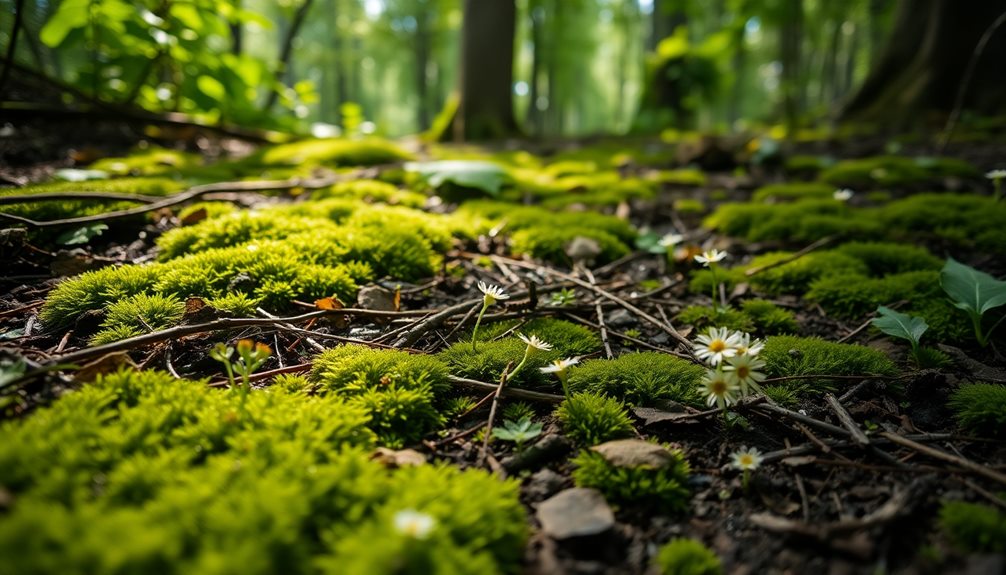
When exploring the earthy aromas of nature, it's important to consider health and safety aspects that can arise. For instance, when you're out in the wild, you might encounter plants or fungi that look inviting but can be harmful. Always be cautious and learn to recognize these species.
Additionally, while the smell of fresh soil can be delightful, it can also carry allergens. If you have allergies, be mindful of how much time you spend in grassy or heavily wooded areas. Wearing a mask can help you enjoy the scents without sneezing your way through a beautiful day.
When you dig into the earth or handle soil, remember to wash your hands afterward. Soil can harbor bacteria or parasites that aren't good for you. If you're gardening, use gloves to protect your skin and avoid any potential irritations.
Lastly, stay hydrated and wear sunscreen if you're exploring for a long time. Nature is amazing, but it's essential to care for yourself while you enjoy its wonders.
Final Thoughts
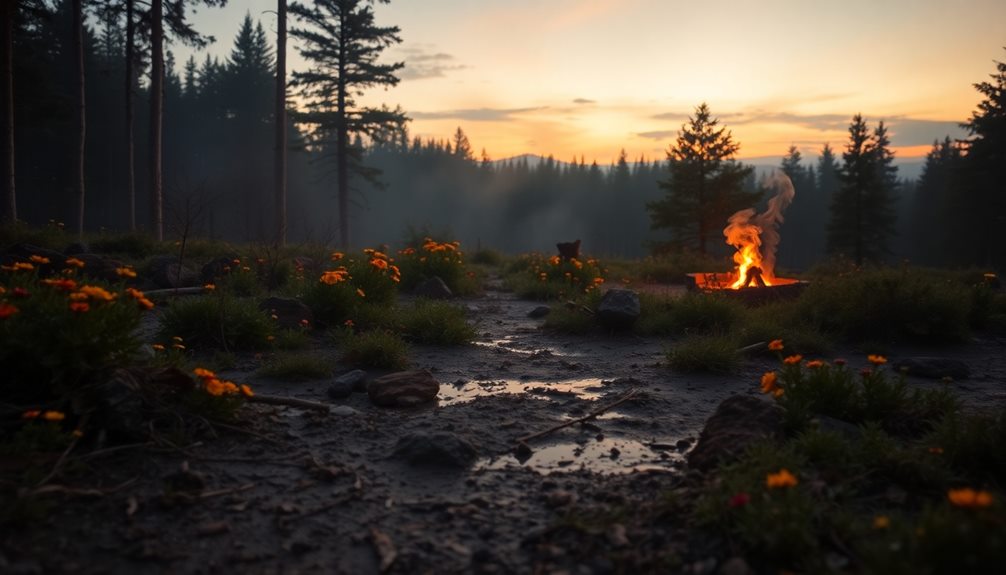
Exploring the scents of nature can be a rewarding experience, but it's equally important to remember the balance between enjoyment and safety. As you venture outside, take a moment to breathe in the fresh air and appreciate the earthy aromas that surround you. The smell of rain on dry ground, freshly cut grass, or blooming flowers can lift your spirits and connect you to the world around you.
Engaging with nature also promotes emotional regulation and can enhance your overall well-being, making it a beneficial practice for both children and adults. Remember that nutrition's role in development plays a key part in how we experience these sensory joys.
However, while you're enjoying these delightful scents, keep an eye out for potential hazards. Some plants, like poison ivy or certain mushrooms, can pose risks. Always educate yourself about your surroundings before diving into nature's fragrances.
Frequently Asked Questions
Can the Smell of Earth Change With Seasons?
Yes, the smell of earth can change with the seasons. In spring, you'll notice fresh, floral scents, while summer brings warm, earthy aromas. Autumn introduces crisp, decaying leaves, and winter offers a chill, damp musk.
Do Different Locations Have Distinct Earth Smells?
Absolutely, different locations have distinct earthy scents. You'll notice how coastal areas smell briny and fresh, while forests offer a rich, damp aroma. Each environment creates its unique olfactory signature, influenced by local flora and soil.
How Does Pollution Affect the Smell of Earth?
Pollution alters your perception of Earth's scent. You might notice a sharper, more chemical odor in urban areas, while natural environments retain earthy, organic smells. Your surroundings shape what you experience and how you feel.
Are There Any Cultural Rituals Involving the Smell of Earth?
Many cultures incorporate the smell of earth into rituals, like planting ceremonies or nature-based festivals. You might find communities honoring the earth's aroma to celebrate harvests, connecting people to their land and its rich heritage.
Can People Be Allergic to the Smell of Earth?
Yes, you can be allergic to the smell of earth. Sometimes, the compounds released from soil, like mold spores or pollen, trigger allergic reactions. If you notice symptoms, consulting a doctor's a good idea.
